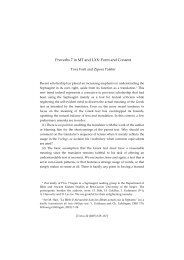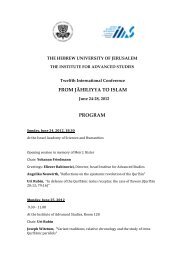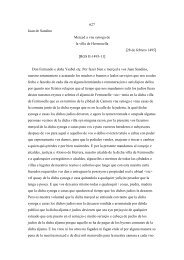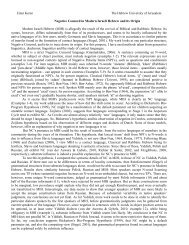Baber Johansen
Baber Johansen
Baber Johansen
Create successful ePaper yourself
Turn your PDF publications into a flip-book with our unique Google optimized e-Paper software.
16<br />
This dissent does not diminish the classificatory aspect of the term qurba<br />
as a quality that is common to acts that bring the actors closer to God.<br />
Ibn ÝAqÐl, the leading Íanbalī scholar in Baghdad at the end of the<br />
eleventh and the beginning of the twelfth century, 57 discusses the notion<br />
of qurba and taqarrub in the same vein. Much like ShÐrÁzÐ, he divides the<br />
Prophet’s acts in those that have a qurba-function and those that do not.<br />
Similarly, he subdivides the acts that bring closer to God into three<br />
groups: acts in response to God’s command, that receive their meaning<br />
from the obligatory or recommended character of the command; acts that<br />
explain polysemous texts of the revelation and that follow the legal effect<br />
of the explained text; and finally, acts in which the Prophet acts on his<br />
own (mubtadiÞan). He enumerates the same three dissenting opinions<br />
about the character of these acts as does ShÐrÁzÐ. 58 Ibn ÝAqÐl sees the<br />
main reason for God’s commands in the effort to come closer to God. He<br />
states:<br />
Truly, God [...] only obliges his obligor to perform an act with the<br />
purpose that he perform this act in a way that is intended to<br />
[serve] the coming closer to Him and the obedience to Him (inna<br />
llÁha [...] innamÁ kallafa man kallafahu fiÝlan an yaqaÞa dhÁlika l-<br />
fiÝlu minhu ÝalÁ wajhi l-taqarrub ilayhi wa l-ÔÁÝa lahu). He obliges<br />
him to avoid an act in order that this avoidance may be enacted by<br />
him with the purpose of coming closer to God.<br />
In other words, God’s commands oblige only people who are in full<br />
possession of their mental faculties. God addresses them to legally<br />
capacitated persons who understand that they should fulfil God’s<br />
commands because they aspire to come closer to God through their<br />
acts. 59<br />
In the eleventh and the twelfth centuries, the notion that the aim of legal<br />
obligations is to bring believers closer to God was generally accepted by<br />
the leading Sunnī jurists. The idea that cultic acts bring the believer<br />
closer to God can be used like a formula that is known by all and is<br />
uncontested. The Transoxanian jurist SarakhsÐ (d. 1090) uses the
















